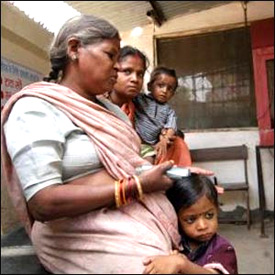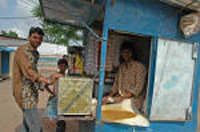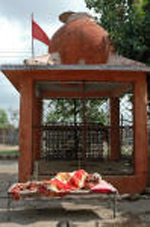|
|
Conditions for Sustainable Change
Working at the grassroots level is essential in dealing with poverty; similarly, efforts to bring about change at both the government and institutional levels are essential to support those working on the frontlines in the slums. While few governments and institutions would object to individuals and agencies working in the slums, they would have serious objections to having Non-governmental Organizations (NGOs) telling them how to run their governments.
The good news is that there are mechanisms for influencing policy, and many organizations are using available forums to educate officials and influence change. However, stakeholder consultation is limited without direct access to policymakers. Old Testament characters Joseph, Esther and Nehemiah illustrate the impact of effective leadership in bringing about sustainable change and minimizing the impact of hardship on those who are suffering.
An effective mission strategy for transforming the slums targets the three primary levels where change takes place: the slum dwellers, institutional officials and government policymakers. Activities need not take place at the three levels simultaneously; however, efforts to bring about sustainable change are required at all three levels. Having a change in government policy without engagement of the poor will not go very far. Similarly, helping the poor without changes in policy is as effective as using a Band-Aid to cure cancer.
What Can I Do to Bring Sustainable Change?
I am a tentmaker. I am paid by international development agencies to advise governments on reforming the power sector so that supplying electricity becomes a commercially viable operation which brings in revenue rather than draining government finances. In many countries, government subsidies to cover the cost of producing and delivering electricity divert meager resources to the extent that there is little left for education, sanitation, health or other social programs. Working for the development agencies gives me access to senior policymakers and the opportunity to advise them on institutional reform based on holistic and good governance principles. ![]()
Just as the Apostle Paul used his status as a Roman citizen to open doors, I use my privileged position to suggest policies for the power sector that are friendly to people living in poverty, and to address issues related to accessibility and ability and willingness to pay. Currently in Bhopal, India, government policy is to provide poor consumers with a single light point connection (i.e. power for one light bulb) at highly subsidized rates.
|
|
When I travel to Bhopal or other places, I see the poor and am moved by their plight. Sadly, I am often moved more by guilt than by compassion. I have difficulty reaching out to the poor because they are a visible reminder that we do not live in the perfect world God intended. I am called to use my skills and experience to help fix the mess perpetuated by the system. While I do not spend time directly working in the slums, I support those who have the power to change the system and straighten out the mess. Without sound government policies and supportive bureaucracy, those who are on the frontlines in the slums are hampered in their efforts to bring sustainable change.
Jaymol’s Story: Teamwork Brings Change
Local staff are key to fixing the system. Jaymol had moved to Bhopal when I hired her husband Yohannan to advise the local electricity company on improving their performance. She had held a senior position in a bank; however, she felt called to pray for and support her husband (who had a regular day job to support his passion for evangelism). While Jaymol, a real prayer warrior, is quiet and reserved, Yohannan has no inhibitions in boldly sharing his faith journey with all who will listen.
One morning, a delegation of women from the poor neighborhood knocked on Jaymol’s door requesting some medicine to heal the evil poison destroying their husbands’ lives. Jaymol was completely baffled by this request—she was a banker, not a doctor. The ladies were pleading for some of the “medicine” (a.k.a. “the Bible”) Yohannan had given Raju, the local neighborhood drunk. Since taking the medicine, Raju had stopped drinking and was now polite and ready to lend a helping hand to others. They wanted their own husbands to change.
Jaymol responded by inviting them to a regular Tuesday night meeting where the medicine (the Bible) would be dispensed with full instructions. Raju would also be there to explain how his life was changed. Yohannan was in a position to influence change at both the institutional level as well as the personal level.
Bhopal Poultry Farm—Ingenuity Brings Change
Just outside of Bhopal, Rajender has brought a “sick” poultry farm back to health. Over a period of years, he used his ingenuity and skills to transform an egg-laying sweatshop factory into a self-sustaining community in harmony with the local environment.
With patience and experimentation, he devised a system to turn chicken droppings into compost that produces methane gas to drive old recycled automobile engines which provide electricity to support the community of twenty people and 100,000 chickens on the farm. By applying water harvesting techniques, he raises the water table on the surrounding land so that even during 44° Celsius (111° Fahrenheit) summer days, there is enough water so that the chickens can have a fine mist spray to cool them down. He then uses the money saved by generating his own electricity to provide medical care and schooling for his entire workforce.![]()
Rajender gives money to the poor; however, he does much more than that. He has used his gifts to build a self-sustaining community. His current project is to use waste from neighboring farms to produce enough methane to power refrigeration units to economically store perishable produce for sale in the off-season.
|
|
Rajender is not a Christ-follower; however, his passion for restoring the world is effectively channeled through his God-given gifts. As Christ-followers, do we respond to poverty with patient planning and experimentation as Rajender did? Or do we run off to implement our ideas without making God an integral part of the planning, design and delivery process?
Are We Using Our Skills Effectively?
Does our passion take us out of our area of expertise? It is easy to be driven by compassion or guilt. However, unless we truly partner with God to focus on where we can make the greatest contribution, we will be giving less than our best.
Jaymol’s gift is praying with a passion. Yohannan’s professional gifting is managing electricity companies; his spiritual gifting is evangelism. As a couple, they were able to not only demonstrate the power of God through their lives, God also used them to change the community where they lived.
Rajender’s curiosity and patience in tinkering brought new life to a run-down chicken farm and support staff who were at the brink of losing their jobs. His passion for making things better helped create an environmentally-friendly enterprise which sustains what was once a marginal community.
I am privileged to have a profession where I can live out my passion to reform systems so that they work for people and not against them. I do not feel guilty about not working directly in slums. I know I am exactly where I should be. With the team God has put together—and all of us working with his agenda—we are making a difference at the policy, institutional and grassroots levels.
God has given each of us skills that are ideally suited to the task he wants to accomplish. Working in the slums and with those living in poverty requires more than just bodies. If we are called to go to the slums or break the poverty cycle, we should go prepared to use all the resources and skills God graciously provides.
Supporting our Frontline Teams
It is easy to be driven by emotion and compassion for those living in poverty—and that is good. However, God has also given us skills, abilities and opportunities within our faith community to bring about changes at the policy and institutional levels. The efforts at these levels increase the effectiveness at the grassroots levels so that our contributions move from relief work to community development that results in sustainable change.
We have people who are prepared to work on the frontlines. Let us pray that God would continue to raise people who will use their professional expertise to support institutional and policy change to support our field teams.




